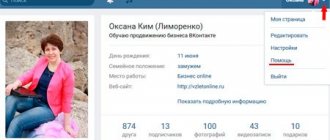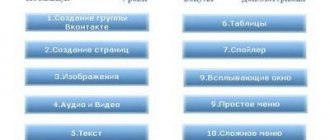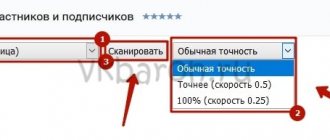So, friends, after the recent modernization, the powers of the leaders of public pages and groups on VKontakte have also been updated. We will talk to you today about how to become an administrator of a VKontakte group, and we will also tell you who a community moderator and editor are, as well as an administrator. In all communities, without exception, one system of authority was established for their leaders. As we have already said, this entire system includes three levels of leadership:
- Moderator
- Editor
- Administrator
These are already entire vacancies, and not just a hobby. How are they different from each other? We strongly recommend that you study these instructions before appointing leaders to your community. After all, if you appoint the wrong person, then a situation may even happen that your community will simply be “hijacked”.
Who is a group moderator?
It should be said that the moderator has the least rights. The purpose of the moderator is to maintain order in the community.
- The moderator has the right to delete comments from social network users in the group and delete discussions created in the group or public.
- The moderator cannot delete topics that were created by another group management.
- The moderator can also delete all photos, videos and music that the user has posted in the last seven days.
- The moderator is not able to delete content that was added by other leaders of the VKontakte community.
- The moderator can approve new users who intend to join the closed community.
- The moderator can blacklist users or simply remove users from the group/public (no more than 100 people per day).
- The moderator can remove users from the emergency situation.
We hope that now you understand who a community moderator is. Now let's talk about the editor.
Instructions: new types of powers in communities
At the end of February, the developers changed the functionality for managing public pages and brought it as close as possible to managing groups.
In all communities, a unified system of authority for leaders was established, which includes three levels: moderator, editor and administrator . Below we will consider in detail the rights of each of them. Before registering users as leaders of your community, carefully read the instructions below to avoid problems associated with violating user rights and even hijacking your community.
Moderator powers
The moderator has the least rights of all levels of management. Its direct purpose is to maintain order. Moderator rights can be grouped into three groups:
1. Rights to delete comments and posts in discussions
- The moderator can: Delete all comments of a specific user for the last week.
- Delete user-created discussion topics.
- Delete comments on behalf of the community.
2. Rights to remove photo/video/audio content
- The moderator can: Delete all photos, videos and audio recordings of a specific user published by him in the community over the past week.
- Delete photos/videos/audios added by other managers.
3. Rights to blacklist and invite new members
- The moderator can: Invite and approve new participants.
- Blacklist and remove members from the community.
- Remove members from the blacklist.
- Blacklist and remove more than 100 members per day from the community.
Editor's rights
In addition to all the rights of a moderator, the rights of an editor also include powers to manage content, design a community, and work with a wall.
1. Rights to the external design of the community:
- Full right to manage the community avatar and edit the status.
- View and edit community wiki pages protected by privacy settings.
- Pinning community posts.
2. Rights to publish and manage content:
- Upload, edit and delete community photos and photo albums.
- Full control over community audio and video recordings.
- Work with documents.
- Manage topics in discussions and the ability to edit participant comments.
3. Rights to the wall:
- Create, edit and delete posts on behalf of the community.
- Working with suggested news.
In addition, editors have the right to view community statistics and change their privacy settings.
Administrator Rights
The administrator is the highest level in community management. He already has all the rights of a moderator and editor. Be extremely careful when assigning other users as administrators.
The administrator has the right:
- Appoint and remove community leaders.
- Edit all information about the community, including short address and name.
- Set up RSS and Twitter synchronization.
- Work with applications: add applications to the community and, conversely, specify the community as the official group of the application.
When assigning a manager, you can also choose whether to display him in the contacts block or not. You can read more about this function in our article New block Contacts in groups.
A few more changes in public management:
- It is now possible to remove members of public pages from the list of subscribers, which was previously implemented by adding the user to the blacklist.
- An instant search by subscribers has appeared, which only works in communities with more than 1000 members.
PS You can read about the most effective ways to promote your community here.
Who is an administrator
An administrator is a person who, in principle, is the most important person in the community. He already has editor and moderator rights, plus:
- He can appoint moderators/editors and remove them if necessary.
- Edit all information about the community completely.
- The administrator can configure synchronization of the community with Twitter and RSS feeds.
- Work with applications: add them to the community, delete them, etc.
Please remember that the administrator can use the authority one hundred percent. Be very careful when you appoint someone as an administrator for your community. There have been real cases when newly-minted administrators simply stole a group or public page. Then they could sell it or run it themselves. If such a story suddenly happened to you, we can only sympathize with you. First, write to the VKontakte support service, perhaps they can help you. Secondly, don’t despair, we all learn solely from our mistakes!
OOS – especially dangerous situations
Oh, how wrong is the one who considers the Internet and SMM to be a frivolous matter: “Just think, a group, some kind of kindergarten! What could happen there? Yes, a lot of things. And the consequences can hit your business.
You may be accused of lying, deception, or incompetence. And it is completely groundless. It will just seem to someone that your products or services are not good enough, and that your employees are boors and bastards. Then go prove that you are not a camel. In the meantime, you prove it - the clock is ticking, people read and draw their own conclusions. And even if you prove it, maybe as in the joke: “either he stole it, or it was stolen from him, but a residue remains.”
They may write prohibited content on your wall . For example, a video or meme that incites ethnic hatred, calls for extremism and other anarchy. And if you didn’t see it/missed it/left it unnoticed, pray that no one notices. You can, of course, choose the ostrich policy and give up: oh, let them write what they want. But if something happens, both the author of the comment (or post) and you, amigo, will respond. We have already written about how you can get caught in an article for making a joke on social networks. Ok, maybe not to jail, but blocking a page is also not a pleasant event.
Yes, you can be blocked . We have already written about the reasons for blocking the VKontakte group. If you’ve gained more subscribers, radically changed your topic, or placed too many third-party advertisements – congratulations, you have a bomb in your hands that can explode at any moment. If you sell prohibited goods - wow, let's move away, it will soon be hot. The shock wave can hit your entire business - especially if some of your customers come from social networks.
You may be sued or complained to in the authorities . Information on the group wall is considered publicly available. If you write something like “We have the best brake pads” - hello, advertising law! You can’t write like that—save evaluative superlatives for personal conversations. Otherwise, a competitor or a dissatisfied client could take advantage of the situation.
Promotion of VKontakte: 75 tips for promoting a group
Administrator Skills
A person involved in administration needs to be able to do a lot, for example:
- Create groups from scratch. Set avatars and make a large number of settings.
- Know how the social network VKontakte works. You need to study the rules well.
- It is necessary to understand the mood and preferences of your own target audience.
- Be able to communicate well and love it.
- Do not perceive various negativity and be resistant to any stress.
- Be as responsible as possible.
A candidate for community admin should be selected depending on the purposes for which the group was created. Due to this, requirements may vary. For the entertainment community, it is necessary to publish exciting news, write a lot of comments and generally moderate the public. If you are developing an information business, then you need to attract subscribers and seriously promote your own products.
How much does a VK administrator earn?
This profession is different in that there are no restrictions on earnings. Profit depends on how competently you approach the matter and what level of qualifications you have. Experience in the profession is also important. Payment can be made based on how many posts you publish or how many hours you work.
Payments can also be made for other actions. It all depends on your agreement with the owner. But it is worth considering that at the beginning the earnings will be small. From approximately 2 thousand rubles per month. Gradually, as you gain experience, you will receive at least 10 thousand rubles for leading one group. You can lead as many communities as you like, the main thing is to correctly calculate the forces.
Where to find a moderator
A remote employee will cost from 5,000 rubles per month. His responsibilities include:
- publishing posts;
- regular inspection of all sites;
- respond to comments and questions;
- technical part of competitions: announcement of the winner, collection of winners’ data for sending prizes.
- You can find such an employee in VKontakte groups about searching for remote work (for example, here: https://vk.com/distantsiya)
A lot of people will respond to a similar vacancy for community moderation, so be prepared that you will receive several dozen messages. Create a separate account for correspondence if you don’t want to clog up your personal one.
The main requirements for a moderator are attentiveness, constant access to the Internet and the ability to write correctly. Give the moderator a detailed task: how often he should check and analyze groups, how to answer typical questions, and in what cases he should forward a question or suggestion to you.
In order not to waste time searching for an answer, each question about a product can be entered into a separate table and the answer recorded. The next time you encounter it, the moderator will be able to quickly find the information and not distract you or your employees.
This doesn't mean the messages have to be the same. Communication on behalf of the company should be lively, and not full of paperwork.
How to make a Facebook administrator
Promotion on Facebook is another integral part of the overall SMM strategy, and in some cases it is the main focus.
How to appoint an administrator in this social network:
a) By logging into your account on the website: www.facebook.com, log in to the profile of the current owner of the group or its administrator.
b) Go to your public page and go to the “Participants” tab.
In the list that appears, find the future administrator and click on the gear icon.
In the list that appears, select “assign as administrator.”
That's all! Another group administrator on the Facebook social network has been appointed. In order to demote any current leader, you need to do the opposite, that is, go to the list of group members and, by clicking on the gear, in front of the administrator, demote.
I would like to note an important fact: on Facebook there are no levels of access to editing information in the form of the roles of “Moderator” or “Editor”, as in Vkontakte. For this reason, by appointing a person as manager, you give him full powers to resolve absolutely all issues that in any way concern the group.
How it all began - moderator on VKontakte
The history of the department (moderators, there is such a department) begins in 2009. It was then that Ivan Korneev (Fig. 1), at the invitation of Pavel Durov, joined the VKontakte Team, having previously been engaged in moderation on a voluntary (disinterested) basis. At that time, almost all the moderators, of whom there were about ten people, worked for the idea and only then became full members of the team.
Fig.1
But already at the beginning of 2010, the first moderation environment appeared, from the emergence of which it is customary to count the date of the birth of a full-fledged moderation department. Together with Ivan, Alexey Bogatov led the fight against the most widespread spam at that time - SMS weight loss, audio drugs, other subscriptions, invites and bots. (Fig.2)
Fig.2
Today there are 107 moderators, most of whom process and systematize user complaints around the clock, using the company’s own modern developments. Back then, back in 2010, the operation of the first moderator interface required a constantly turned on computer, from which a script was launched on the server to clean up content and ban hacked users and bots.
>>> Ivan Korneev - head of the moderation and administration department of VKontakte “About ten tabs in the browser were updated in increments of five seconds. The computer got so hot that sometimes I had to turn off the heating in the room. Subsequently, we automated the process, but I had a working “stove” for a long time.”










